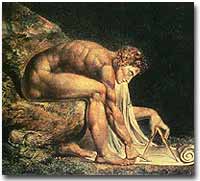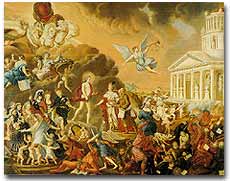What Political And Economic Changes Took Place During The Age Of Reason

7a. The Impact of Enlightenment in Europe

Blake
Blake'due south representation of Newton.
The Historic period of Reason, every bit it was called, was spreading rapidly across Europe. In the belatedly 17th century, scientists like Isaac Newton and writers similar John Locke were challenging the old order. Newton's laws of gravity and motion described the world in terms of natural laws beyond any spiritual force. In the wake of political turmoil in England, Locke asserted the right of a people to change a government that did non protect natural rights of life, freedom and holding. People were beginning to doubt the beingness of a God who could predestine homo beings to eternal damnation and empower a tyrant for a king. Europe would be forever changed by these ideas.

In America, intellectuals were reading these ideas as well. On their side of the Atlantic, Enlightened ideas of freedom and progress had a take chances to flourish without the shackles of Onetime Europe. Religious leaders began to modify their one-time dogmatic positions. They began to emphasize the similarities betwixt the Anglican Church and the Puritan Congregationalists rather than the differences. Fifty-fifty Cotton fiber Mather, the Massachusetts minister who wrote and spoke and then assuredly about the existence of witches advocated scientific discipline to immunize citizens against smallpox. Harvard ministers became then liberal that Yale College was founded in New Oasis in 1707 in an attempt to retain erstwhile Calvinist ideas. This effort failed and the entire faculty except one converted to the Church of England in 1722. Past the end of the century, many New England ministers would get Unitarians, doubting even the divinity of Christ.

painting by Duplessis
Triomphe de Voltaire
New ideas shaped political attitudes as well. John Locke defended the displacement of a monarch who would not protect the lives, liberties, and property of the English language people. Jean-Jacques Rousseau stated that lodge should be ruled by the "general volition" of the people. Baron de Montesquieu declared that ability should not be concentrated in the hands of any i individual. He recommended separating power among executive, legislative, judicial branches of government. American intellectuals began to blot these ideas. The delegates who declared independence from Great britain used many of these arguments. The entire opening of the Declaration of Independence is Thomas Jefferson's application of John Locke's ideas. The constitutions of our first states and the United States Constitution reverberate Enlightenment principles. The writings of Benjamin Franklin made many Enlightenment ideas accessible to the general public.
The old style of life was represented by superstition, an angry God, and absolute submission to authority. The thinkers of the Age of Reason ushered in a new style of thinking. This new way championed the accomplishments of humankind. Individuals did not accept to have despair. Scientific discipline and reason could bring happiness and progress. Kings did non rule by divine correct. They had an obligation to their subjects. Europeans pondered the implications for nearly a century. Americans put them into practice first.
![]()
If yous similar our content, please share it on social media!

![]()
Source: https://www.ushistory.org/us/7a.asp
Posted by: warrenexhaf1942.blogspot.com


0 Response to "What Political And Economic Changes Took Place During The Age Of Reason"
Post a Comment